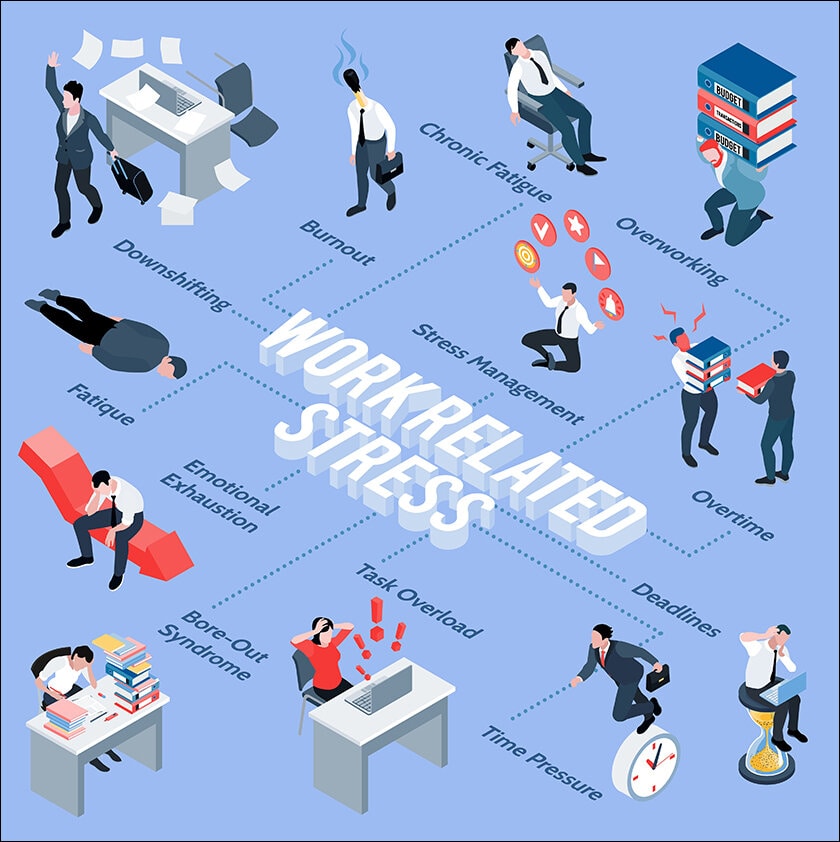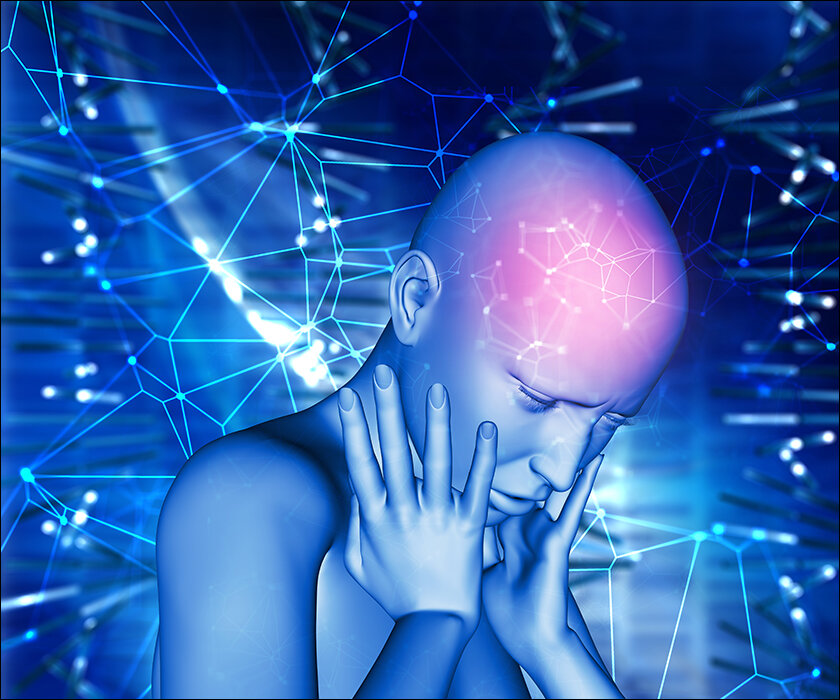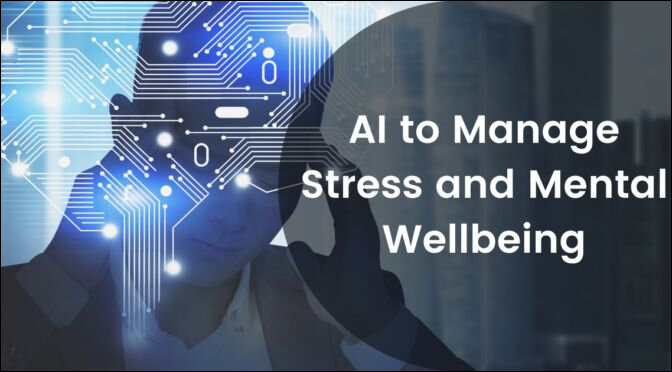The fusion of AI-driven innovations with the wisdom of mental health professionals creates a dynamic synergy, empowering individuals to navigate stress with resilience, heightened awareness, and unwavering support.
In the ever-changing dynamics of a nation like India, stress has become an intrinsic part of daily existence, impacting people from various socio-economic strata. Whether individuals are aspiring to improve their quality of life or grappling with survival challenges, the pervasive influence of stress is undeniable. Yet, amid this widespread experience, the true hurdle lies in adopting successful stress management techniques, encompassing traditional approaches like yoga and meditation to modern, technology-assisted methods.
The Pervasive Impact of Stress on Well-being
Considering the profound influence of stress on mental health, physical well-being, and overall quality of life, there is an increasing agreement that technology, specifically artificial intelligence (AI), holds the promise to democratize stress management, rendering it accessible and impactful for a broader audience. In the contemporary scenario, a plethora of applications offer support in the realms of mindfulness, meditation, and diverse stress-relief tools. It is within this framework that AI emerges as a revolutionary influence, poised to elevate these endeavours to a new level of effectiveness.

AI’s Personalized Approach to Stress Management
The pivotal role of AI becomes evident in its ability to personalize stress management strategies, delving into individual preferences and soliciting feedback on their effectiveness. Envision an application that learns from your usage patterns, comprehends your peak stress moments, and customizes its recommendations accordingly. This AI-driven tool functions as a dynamic guide in stress management, meticulously curating plans tailored to user-specific needs and incorporating scientifically supported tools. For instance, if a user consistently discovers solace in guided meditation during high-stress periods, AI can prioritize and suggest this tool more frequently.
The instantaneous feedback loop, frequently coupled with biofeedback monitoring devices, quantifies the influence of mindfulness activities on individuals, elevating the accuracy of stress-relief interventions. Envision a situation where a user obtains instant feedback on their stress levels following a meditation session, establishing a tangible link between their efforts and outcomes. This not only encourages sustained involvement but also refines the AI’s suggestions, aligning them more closely with the user’s responses.
Moreover, AI’s analytical capabilities go beyond providing immediate feedback, delving into the identification of distinctive patterns within user behavior associated with stress. This offers invaluable insights into their mental health landscape, playing a crucial role in tailoring personalized stress management plans. For example, if an individual consistently utilizes stress-relief tools at specific times of the day, the AI can adapt and proactively recommend interventions during those periods. Additionally, AI acts as a proactive tool, highlighting instances where more intensive mental health care may be necessary. If the user exhibits patterns indicating a prolonged increase in stress levels, the AI can prompt them to consider professional intervention.
AI’s Role in Affordability, Scalability, and Accessibility
AI plays a pivotal role in enhancing the scalability, accessibility, and affordability of mental health support, filling crucial gaps in the current landscape. From enabling one-on-one consultations to notifying emergency contacts and facilitating SOS care, AI ensures that mental health assistance is readily available and cost-effective. For instance, an AI-powered app can seamlessly connect users with mental health professionals for virtual consultations, providing timely support and widening accessibility. This not only expands reach but also acts as a safety net for users navigating severe stressors.

Nevertheless, it is crucial to recognize the irreplaceable role of the human factor in this equation. Mental health professionals are essential contributors to the development and oversight of AI-driven apps, shaping guidelines and recommending tools. Their regular reviews of AI suggestions, along with their direct connectivity to therapists working with individuals, ensure alignment with therapeutic evaluations. In cases where a user undergoes a shift in mental health status that AI alone might not detect, the human professional can offer additional insights from their sessions, providing nuanced perspectives and adjusting the overall mental health strategy as needed. This collaborative approach harmonizes the strengths of AI with the expertise and empathy of human professionals, creating a comprehensive and effective mental health support system.
AI-Powered Product Development Revolution
In the realm of product development, AI stands out as a revolutionary catalyst, transforming mental health products to address the distinct situations, requirements, and inclinations of every individual. Acknowledging the profoundly personal aspects of mental health and stress, AI facilitates an exceptionally tailored, responsive, and adaptable methodology. Routine check-ins play a crucial role in discerning shifts in preferences and requirements, allowing the generation of comprehensive progress reports and analyses of usage patterns. This heightened level of personalization significantly enhances the efficacy of stress relief, ensuring a more precise and individualized approach to well-being.
The Future of Stress Management: A Synergy Between AI and Human Expertise
In essence, the infusion of AI into stress management not only broadens access but also furnishes a personalized and adaptive solution to the intricate and profoundly personal aspects of stress and mental health. The harmonious collaboration between AI and mental health professionals ensures a thorough and efficient approach, paving the way for a future where stress management is not just accessible but intricately aligned with the individual needs of each person. This heralds a new era of mental well-being.

A Future of Resilience and Well-being
As we wrap up this journey into the confluence of technology and mental well-being, it becomes clear that the proliferation of mindfulness apps, coupled with the transformative impact of AI, delineates a promising path towards a future where stress management is not only within reach but intricately tailored to individual needs. The synergy between state-of-the-art technology and human expertise constitutes the essence of a holistic and personalized approach to mental health.
In this ever-evolving landscape, the pursuit of mental well-being unfolds through the symbiotic dance of technology and the compassionate guidance of human expertise. The fusion of AI-driven innovations with the wisdom of mental health professionals creates a dynamic synergy, empowering individuals to navigate stress with resilience, heightened awareness, and unwavering support.
The future of stress management paints a picture of harmonious coexistence between technology and the human touch. The proliferation of mindfulness apps, enriched by the revolutionary force of AI, marks the advent of an era where individuals embark on a journey toward mental well-being that is not only accessible and effective but deeply considerate of their unique needs. As we tread this path, may it guide us to a future where each person can cultivate a resilient and balanced mind, contributing to a society that thrives on holistic well-being.









